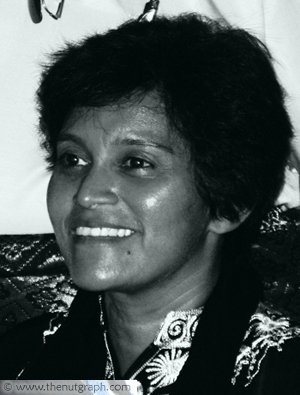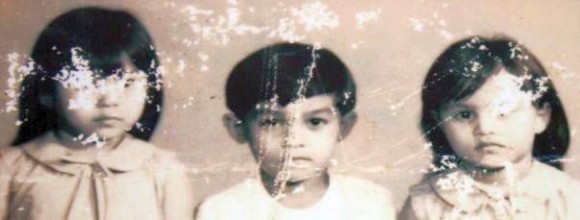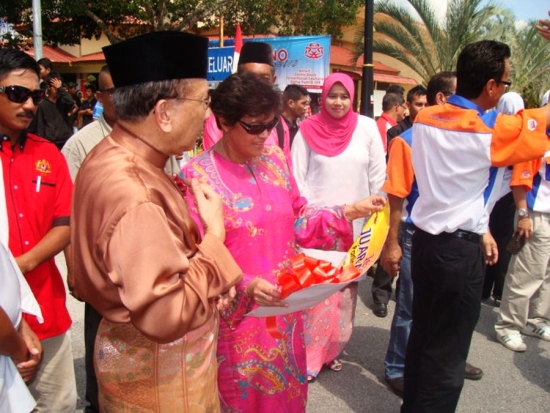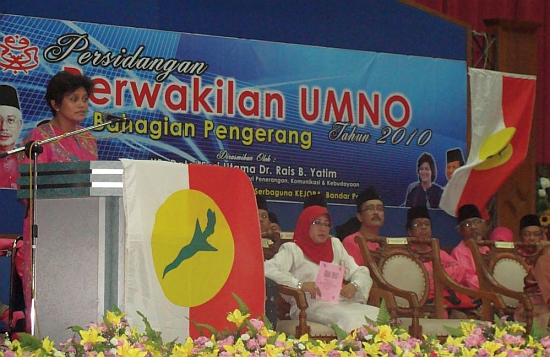
DATUK Seri Azalina Othman Said is no stranger to Malaysians. The lawyer and former television personality burst onto the political scene in her thirties when she was appointed to sit on the Umno supreme council by then president and Prime Minister Tun Dr Mahathir Mohamad.
Azalina has held various positions within Umno, including vice-president and Puteri Umno chief. She has also held two ministerial positions – from 2004 to 2008 as youth and sports minister, and from 2008 to 2009 as tourism minister. She was not reappointed a minister when Datuk Seri Najib Razak became prime minister in April 2009. She is currently Member of Parliament for Pengerang, and also Umno Pengerang division head.
The Nut Graph interviewed Azalina on 6 Sep 2010 at a buka puasa event in Gombak.
TNG: Where were you born, and where did you grow up?
Azalina: I was born in Johor in 1963. I grew up everywhere. My father was a government servant and he was transferred from state to state. But I’m a Johorean by nature. I eat Johorean food, I talk like a Johorean.
What are your strongest memories of the places where you grew up?
I enjoyed Penang very much. The food – roti canai, mee goreng. I stayed in Green Lane. Opposite my house was a Catholic church. I remember I used to play on the Catholic church field. I would go in and out of the church compound. The priest there, he was like an uncle to me. I never saw him as a Christian, I just saw him as a nice man who was kind and gentle with all the kids in the neighbourhood.
Growing up was about friends. I used to go cycling with my Malay, Chinese and Indian [Malaysian] friends, girls and boys. I never felt that I was uncomfortable among non-Malay [Malaysians]. Festivals like Deepavali, Chinese New Year, Hari Raya were a reason to party with friends.
I went to school at Convent Green Lane, which was run by nuns. Our principal was a nun, she wore the nun’s [habit] in school. I never saw her or our teachers as any different just because they were nuns. Although having said that, I did see my agama teacher as different – she was very strict. I remember her, she had a rotan.
Can you trace your ancestry? Where were your parents and grandparents from?
My mother is of Arab ancestry, my father is Bugis. His ancestors were from Indonesia.
Are there any stories that you hold onto from your parents and grandparents?
There are stories about my paternal grandfather who was a customs officer in Johor Baru. I never met him, but I [know] he was a government servant. On my mother’s side as well, they were involved in government administration, so I guess I have that administrative history in my family.

How do you connect to these stories as a Malaysian?
I feel that nobody owns Malaysia. All of us are “foreigners” in a way. We are all descendants of people who came here from somewhere else. But we are all Malaysian.
Are there any struggles you have with your identity as a Malaysian?
I think there is a perception that Malaysians are lazy, very relaxed and satisfied, and not willing to work hard to achieve. I feel this perception is incorrect and Malaysians should be more well-known abroad as achievers.
You’ve held many positions within Umno. What were some of the highlights?
Leading Puteri Umno was a good experience, especially getting a few hundred thousand women with no political experience to be part of the party and understand politics and Umno. Women play a very important role in the party.
Unfortunately, they are sometimes their own biggest enemy because they censor and limit themselves. In reality, a woman stands a good chance of running for president or deputy president because there are more women party members. But it doesn’t work that way, whether due to culture, religion, or the perception [that women cannot lead].
I don’t think Umno likes strong women. Look at Tan Sri Rafidah Abdul Aziz, she’s very strong. She’s extremely proactive, intelligent, focused and vocal, but I think because of that, she may not be that popular within Umno. They like women who are feminine and soft. I’m the only woman division head in Umno. There was a guy who ran for the post against me and I won and was elected.

What are some of the challenges you’ve faced in politics as a woman leader?
It’s been challenging as a woman leader, especially when you’re not married. There’s a lot of negative perception about that. It’s difficult to attend weddings sometimes. Usually, in Malaysia, you attend weddings with your husband, but I go alone. Every time I go to a wedding, there’ll be an empty chair next to me.
The challenging part is, at every wedding, I’ll always be asked, “When are you getting married?” Not just at one wedding, but at multiple weddings. There’s an expectation to get married, especially as a Malay [Malaysian] politician. But I think people should not dictate how we live our personal lives, whether or not someone should get married. That’s entirely a personal decision.
Describe the kind of Malaysia you would like for yourself and for future generations.
I would like Malaysians to be more open-minded, more responsible and more grateful for what they have. We have so much compared to many countries and our neighbours, we should be thankful. We are a fantastic country and we should make efforts to stay that way and become better.
I think the Malaysian political leadership must be more focused on the right way to set Malaysia on its future direction. Things like political assassination should not be encouraged. Whether we like it or not, the government and the opposition have to work together to build Malaysia. I think we need responsible political leadership.

And what kind of Umno would you would like to see in the future?
I’d like to see an Umno that is more relevant to young people. An Umno that doesn’t focus on form, but more on substance. I would like Umno not to have “expected expectations”. It must be able to think outside the box. It must think beyond Malays, beyond Muslims. It must be relevant. I think in years to come, there will not be any racial parties, we will be more focused on issues, not race. That will be the future. ![]()
The book Found in Malaysia, featuring 50 of our best interviews plus four previously unpublished ones with Datuk Zaid Ibrahim, Tan Sri Rafidah Aziz, Datin Paduka Marina Mahathir and Ramli Ibrahim, is now available at all good bookstores for RM45.
The Nut Graph needs your support


Steven says
This is the kind of sensible thinking by a true leader. Let’s focus on issues that are important to the country and cut out the racial and religion bigotry. All people under the Malaysian sun are sons and daughters of Malaysia and let’s keep it at that!
ADHA says
As she is no longer in cabinet, it doesn’t surprise me; [politicians] only say this when there is no more gain/interest. One minute, they say this, the next minute, they say something else. If anyone has any guts, these politicians would just say it to the faces of the Umno members during the coming general assembly. Then we might have some good things to say about these chameleons.
m.k. says
Looks like an impressive track record in Umno. She suddenly became a full minister in 2004, but why was she not reappointed by Najib when he became PM? Most of us know why…
fika N. says
In general, I used to find those in Umno to be very narrow-minded (even though some of them are successful). But after reading her comments and opinions, it makes me believe that there are great open-minded leaders in Umno.